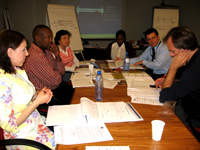Preserving the Historical Record of the International Criminal Tribunal for the Former Yugoslavia
 Records management staff break out into small groups during the workshop to identify their goals for the records of the tribunal.
Records management staff break out into small groups during the workshop to identify their goals for the records of the tribunal.
CTG staff, Theresa Pardo and Donna Canestraro, recently had the unique opportunity to visit The Hague to work with United Nations staff responsible for creating a historical record of the International Criminal Tribunal for the former Yugoslavia (ICTY). Theresa and Donna developed and facilitated a week-long workshop attended by ICTY senior management and records management staff.
The purpose of the workshop was two-fold: first to assist senior management with the creation of a roadmap for preserving the historical record of the work of the Tribunal as they move towards closure in 2011, and second to work with the records management staff in assessing the current record preservation capability of the Tribunal.
The workshop was a milestone event for the Tribunal in that it brought senior management and records management staff together for the first time to focus on the criticality of the historical record to the ongoing societal and legal responsibility of the Tribunal, as well as to assess the resources available to meet these responsibilities. The first activities of the workshop were designed to identify common concerns and priorities. Collectively, participants identified the challenges facing the Tribunal. The lack of a shared vision both within the Tribunal and beyond with key stakeholders, limited resources, workforce reductions related to the closing, and the complex organizational structure of the tribunal body itself were all cited as contributing factors.
Through a variety of exercises and discussions, the participants produced a set of three priority goals for the ICTY in terms of the historical record.
- Accessibility to the records from a historical perspective, a restorative perspective, and a judicial perspective.
- Transparency between UN organizations external to ICTY, internal within ICTY, and external to all other ad-hoc tribunals.
- Establish a precedent for all future tribunals and ad hoc courts that need to preserve a record of their work, as well as a record for historical purposes.
During the rest of the workshop, participants used a variety of analytical tools, in particular CTG’s digital preservation capability assessment toolkit, together with group discussions to identify the policy, management, and technology capabilities necessary to achieve these goals and to assess the availability of those capabilities within the Tribunal. The first major step was taken during the workshop itself; a senior management team was assigned the task of drafting a strategic vision to guide the ongoing work of both groups. A draft statement was vetted by the participants and became the framework for reaching out to key stakeholders in the interest of forming strategic partnerships around the goals.
In closing the workshop, CTG offered four recommendations to ICTY toward achieving the newly articulated vision:
- Create a strategic plan for cross boundary communications between senior management and records management staff.
- Create a learning environment for records management staff in archival appraisal and records management.
- Institutionalize a records management coalition to ensure knowledge sharing and capacity building will continue.
- Explore external partnerships with external groups who are interested in preservation from a historical or research perspective, as well as those who are interested in preserving and venerating the memory of the victims for future generations.